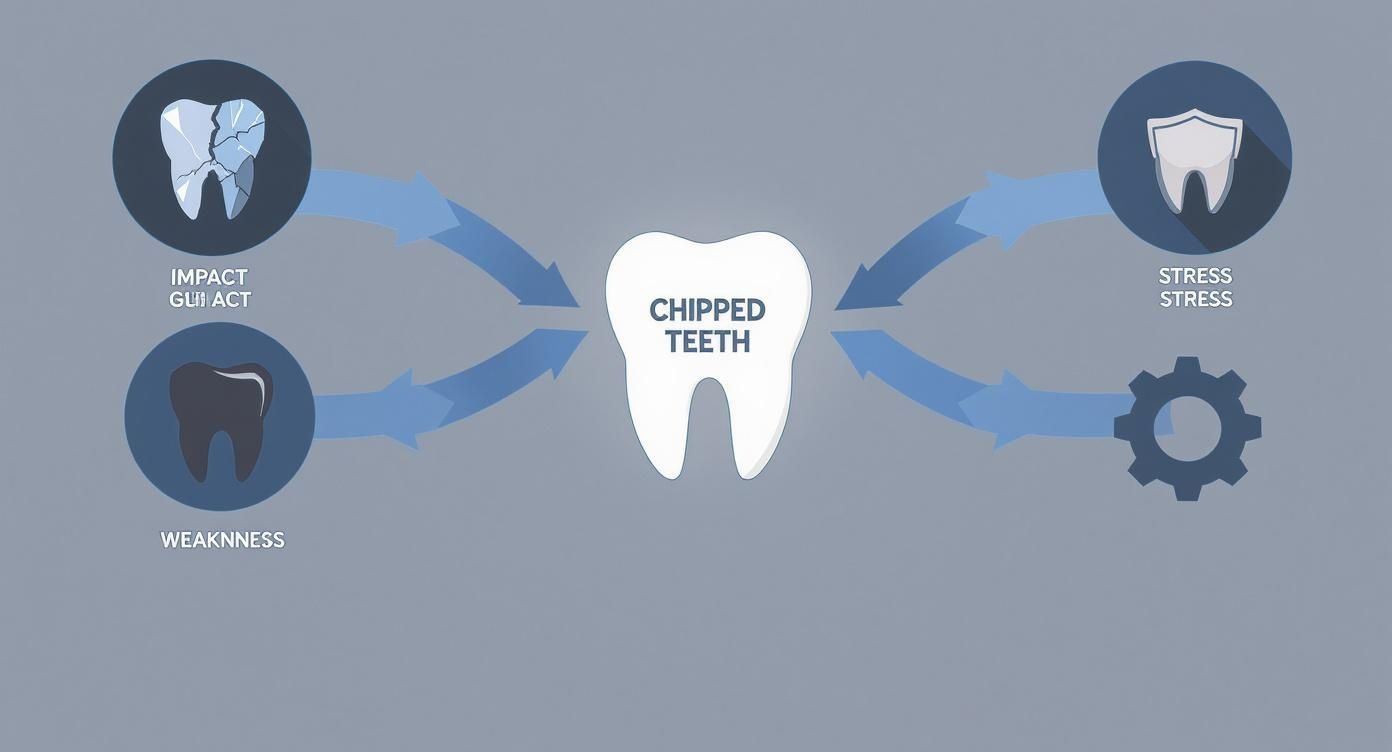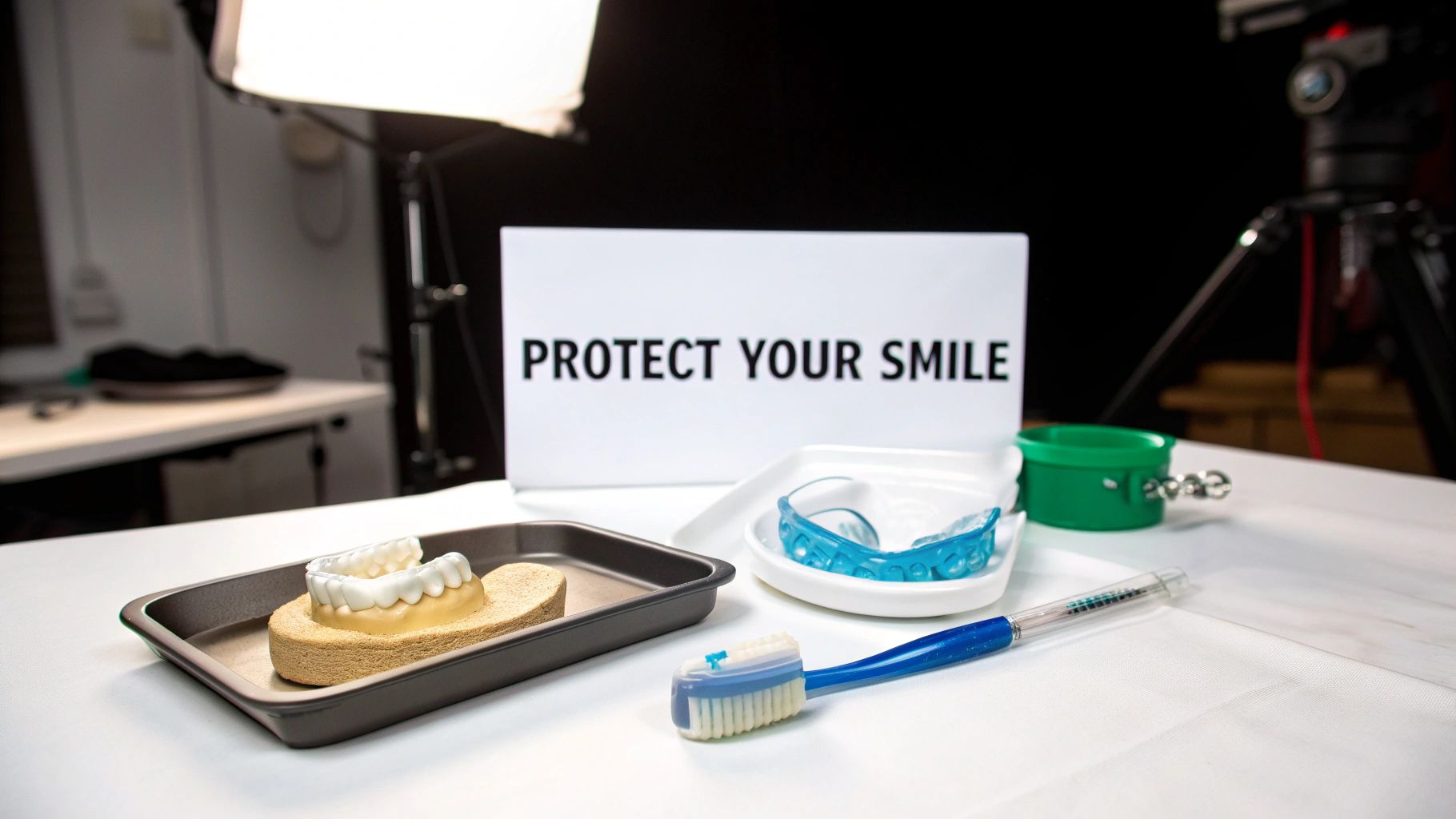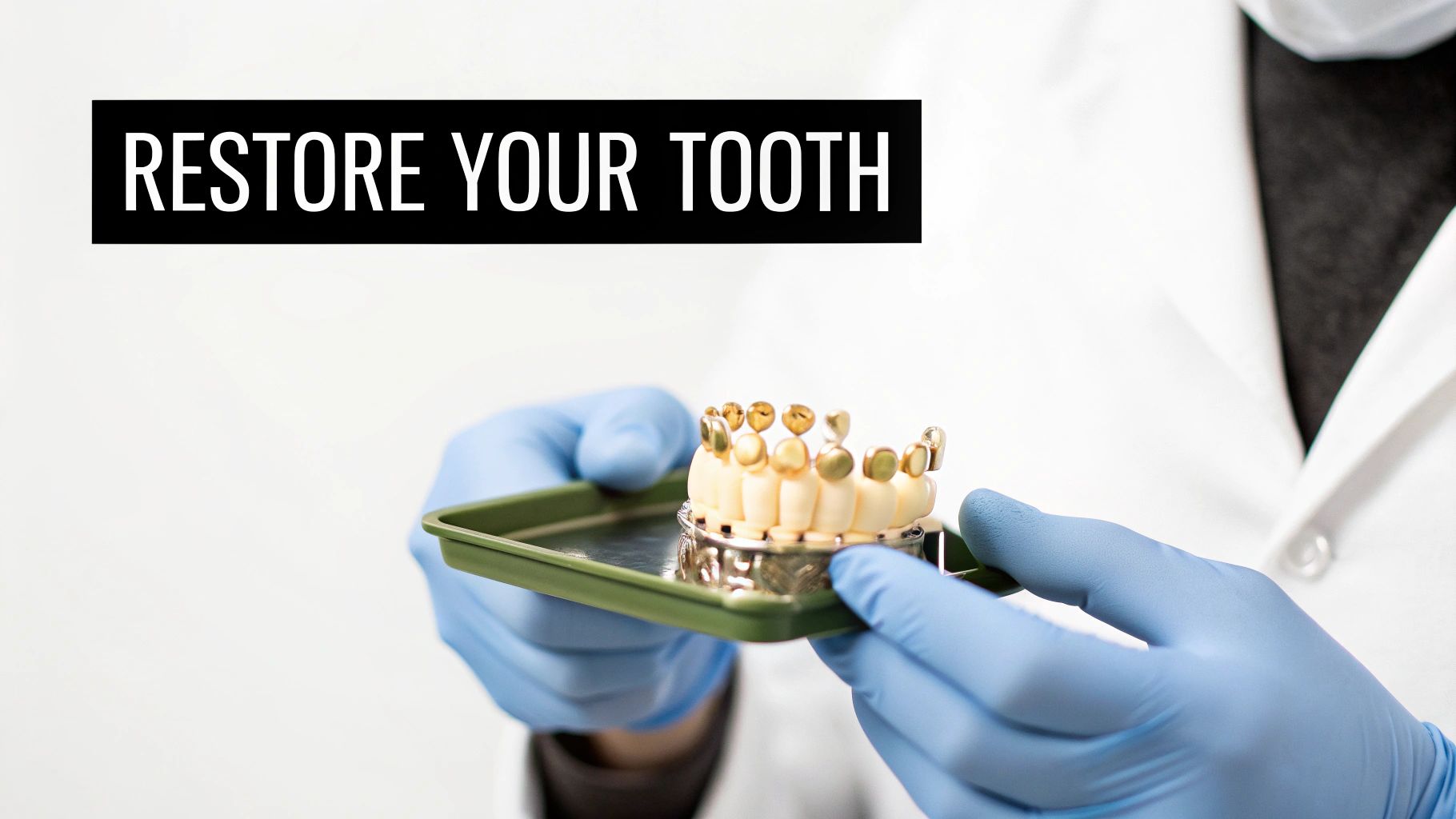What Causes Teeth to Chip and How You Can Prevent It
- Caterina Rutter
- Oct 28, 2025
- 10 min read
It's a frustratingly common experience: you bite into something you've eaten a hundred times before, and suddenly, you feel that jagged edge. A piece of your tooth is gone. Why does this happen, and what can you do to stop it?
Most of the time, a chipped tooth isn't from a single event. It's the final straw after a tooth has been slowly weakened. The causes generally fall into one of three categories: a sudden impact, an underlying weakness in the tooth, or the slow, grinding pressure of repetitive stress. Your tooth enamel is like a ceramic mug—incredibly tough, but also brittle. A sharp knock or a pre-existing crack can cause it to fracture. Understanding these triggers is the first step toward prevention.
Why Your Teeth Chip and What to Do First
That surprise chip often feels random, but the tooth was likely compromised long before it broke. A combination of your daily habits and overall dental health can weaken a tooth's structure over time, leaving it vulnerable to the normal pressures of chewing.
Identifying what causes this weakness is the key to preventing it from happening again. This infographic breaks down the main pathways that lead to a chipped tooth so you can see where your risks might lie.

As you can see, a chip can come from a direct blow, but it's just as likely to be caused by internal weakness or chronic stress. This is exactly why biting into a soft sandwich can sometimes be the final nudge that a pre-weakened tooth can't handle. Your goal is to strengthen the tooth from the inside and protect it from the outside.
The Main Culprits Behind a Chipped Smile
So, what are these hidden dangers? The reasons teeth chip can be broken down into a few distinct categories. Some are obvious, like a fall, but others are subtle habits you can change today to protect your smile.
To make it clearer, let's break down the most common factors that set the stage for a chipped tooth. This table gives a quick overview of what to watch out for so you can take preventative action.
A Quick Look at Common Causes of Chipped Teeth
Cause Category | Specific Examples | How to Take Action |
|---|---|---|
Direct Impact | Sports injuries, falls, or biting down on hard foods like ice or popcorn kernels. | Wear a mouthguard for sports; avoid chewing on inedible, hard objects. |
Repetitive Stress | Chronic teeth grinding (bruxism), chewing on pens, or using teeth as tools. | Ask your dentist about a nightguard; find other outlets for nervous habits. |
Weakened Structure | Tooth decay, large fillings that compromise integrity, or age-related enamel wear. | Maintain excellent oral hygiene; get regular dental check-ups to monitor old fillings. |
Each of these categories contributes, but they often work together. A tooth with a large filling (weakened structure) is far more likely to chip from grinding (repetitive stress) than a perfectly healthy tooth. Strengthening one area helps protect you from another.
The Daily Habits That Secretly Weaken Your Enamel

While we often blame a single accident, the damage usually starts much earlier. It’s the slow, steady pressure from our everyday routines that sets the stage. These habits create tiny, invisible stress fractures in your enamel, weakening the tooth’s structure until one day, something minor causes a noticeable break.
A prime example is bruxism, or chronic teeth grinding. Many people do it unconsciously, especially while sleeping. This habit puts tremendous repetitive force on your teeth. It's like bending a paperclip back and forth—eventually, the metal fatigues and snaps. That’s what bruxism does to your enamel over years. If you wake up with a sore jaw, a dull headache, or sensitive teeth, ask your dentist to check for signs of grinding.
Unconscious Actions With Major Consequences
Besides grinding, many other seemingly harmless habits put intense pressure on individual teeth. Stop using your teeth as a built-in tool to open plastic packages, tear tape, or hold pins. Each time, you're risking a chip. The same goes for biting your fingernails or chewing on hard objects like pens, ice cubes, or un-popped popcorn kernels.
These habits, along with direct trauma, are huge factors in why people chip their teeth. Some dental research shows that up to 10% of U.S. adults have chipped a tooth, and many cases come from simply biting down wrong on hard foods. With lifestyle changes and rising anxiety, we've also seen a documented increase in chipped teeth directly linked to bruxism.
Actionable Tip: The real danger isn't one action but the cumulative effect. Identify one habit—like chewing ice or using your teeth as a tool—and consciously work to stop it. This small change can save you from a future chip.
How Your Diet Can Erode Your Defenses
What you eat and drink directly impacts your tooth's durability. A diet high in acidic foods and beverages—like citrus fruits, soda, and sports drinks—can literally dissolve your enamel. This chemical process, known as dental erosion, thins that protective outer layer, leaving your teeth brittle and more likely to fracture. To counter this, rinse your mouth with water after consuming acidic items and wait at least 30 minutes before brushing.
On top of that, eating extremely hard foods like certain nuts, hard candies, or biscotti raises the odds of an immediate fracture. Recognizing these bad habits that could harm your teeth is the first and most important step toward building a stronger, more resilient smile.
The Hidden Reasons Your Teeth Might Be at Risk
While bad habits and accidents are obvious culprits, sometimes the real reason is hiding beneath the surface. Certain biological and historical factors can silently weaken your teeth, making them surprisingly fragile. Knowing these risks allows you to be extra vigilant with your dental care.
Think of your tooth enamel like the shell of an egg. If that shell is naturally thin or has been worn down, it doesn't take much force to create a crack. That’s a perfect picture of what can happen to our teeth.
The Natural Toll of Time
One of the biggest risk factors for chipping a tooth is simply getting older. Over the years, the protective layer of enamel naturally thins out, leaving the tooth far more vulnerable to chips and cracks from normal biting and chewing.
This isn't just a theory; we see it in practice all the time. In fact, what dentists call "cracked tooth syndrome" is most common in people over 40 years of age. Some studies show its prevalence could be as high as 80% in that age group. You can discover more insights about age-related dental risks and why this happens. A bite that your teeth handled easily in your twenties might be just enough to cause a chip in your fifties.
Your Genetic Blueprint and Bite
Just like your genes decide your hair color, they also influence your dental health. Some of us are born with enamel that's a bit thinner or softer. Your bite alignment—another inherited trait—is just as important.
When your teeth don't line up properly (a condition called malocclusion), some teeth take more than their fair share of the biting force. This creates constant, uneven pressure on specific spots, making them prime candidates for a chip. If you suspect an issue, ask your dentist to evaluate your bite during your next check-up.
Actionable Tip: A poorly aligned bite can turn a single tooth into a weak link. If your dentist identifies malocclusion, discussing orthodontic options isn't just about cosmetics—it's a proactive step to prevent future chips, cracks, and wear.
The Lasting Impact of Old Dental Work
Ironically, dental work you had done years ago to fix a problem can sometimes lead to a chip down the road. Large fillings, in particular, can unintentionally create weak points in a tooth’s structure.
Even though a filling patches up a cavity, it’s not as strong as your natural tooth.
Large Fillings: When a filling is very large, it can act like a wedge, putting outward pressure on the remaining natural tooth walls.
Structural Compromise: The seal between the filling and the tooth can also wear out over time, allowing tiny, invisible fractures to form along the edges.
This is exactly why a tooth with an old, large filling is so often the one that ends up chipping. Be proactive by having your dentist regularly examine your old fillings for signs of wear and tear.
Actionable Strategies to Prevent Chipped Teeth

Knowing what causes teeth to chip is one thing, but actively preventing it is another. Protecting your smile comes down to a mix of smart eating, tweaking habits, and shielding your teeth from excessive force. By working these simple strategies into your routine, you can significantly reduce your risk of a painful chip or crack.
The goal is to strengthen your teeth from the inside while reducing the outside pressures that cause them to break. It’s not about a total life makeover—just small, meaningful changes that add up.
Fortify Your Diet for Stronger Enamel
What you eat has a direct line to your enamel's resilience. To build teeth that can better withstand chipping, focus on packing your meals with the right nutrients. A diet loaded with calcium, vitamin D, and phosphorus is crucial for keeping your tooth structure solid.
Calcium-Rich Foods: Make sure you're getting plenty of dairy (milk, cheese, yogurt), leafy greens like spinach and kale, and almonds. These are the core building blocks for your teeth.
Phosphorus Sources: Foods like fish, eggs, and lean meat help your body absorb and use the calcium you're consuming.
Vitamin D: A little bit of sunshine, fatty fish, or fortified foods will help your body regulate calcium and phosphorus properly.
Making these simple dietary tweaks is like actively building up your teeth's natural armor. These are just some of the simple tips for maintaining good dental health that really work.
Modify Habits and Protect Your Teeth
Beyond what you eat, your daily habits can make or break your smile. If you know or suspect you grind your teeth at night (bruxism), a custom-fitted nightguard from your dentist is a non-negotiable. It acts as a shock absorber, taking the incredible pressure that would otherwise create tiny fractures in your enamel while you sleep.
It's the same idea for sports. If you're involved in contact sports or any activity where a hit to the face is a possibility, always wear a protective mouthguard. This one piece of gear can be the difference between a close call and a trip to the emergency dentist. Think of it as a helmet for your teeth.
Modern Dental Solutions for a Chipped Tooth

If you've chipped a tooth, take a breath—it’s a highly fixable problem. Your dentist has a range of techniques to repair the damage and restore your tooth's original strength and appearance. The best fix depends on the chip's size and location.
The top priority is to save as much of your natural tooth as possible. From there, your dentist will recommend a repair that is both durable and looks completely natural. Whether it's a tiny cosmetic touch-up or a more serious structural fix, there’s a solution that will work for you.
For Small, Cosmetic Chips
When you're dealing with a minor chip, especially on a front tooth, dental bonding is often the go-to solution. Your dentist applies a tooth-colored composite resin to the chipped area, shapes it to match your tooth's contours, and then uses a special light to harden it. The process is usually completed in one fast, painless visit, making it a fantastic choice for small imperfections that don't affect the tooth's overall integrity. You can learn more in our practical guide to the dental bonding procedure.
For Larger Chips and Front Teeth
For a more substantial chip or when you need a super durable, stain-resistant fix for a front tooth, veneers are an excellent option. A veneer is a wafer-thin, custom-made shell, usually of porcelain, that is bonded to the entire front surface of the tooth.
A veneer doesn't just patch the chip; it creates a brand-new, flawless facade for the tooth, completely revitalizing its appearance while adding a layer of protection.
For Significant Structural Damage
When a chip is so big it weakens the tooth, a dental crown is typically recommended. Think of a crown as a custom-fitted helmet for your tooth. It’s a tooth-shaped cap that covers the entire visible portion of the tooth, restoring its original shape, size, and strength. A crown holds the compromised tooth together, protecting it from the forces of biting and preventing any further damage.
Your Top Questions About Chipped Teeth Answered
Even after learning the causes, you probably have a few pressing questions. Let's get right to the most common concerns people have when they chip a tooth.
Can a Small Chip in a Tooth Heal Itself?
Unfortunately, no. Unlike bones, tooth enamel is not made of living tissue and cannot regenerate or heal itself. Even a tiny chip can create a rough edge that attracts plaque or a weak point that can lead to a larger fracture later on. That's why it's always best to have a dentist evaluate any chip, no matter how small it seems.
Is a Chipped Tooth a Dental Emergency?
It depends on the severity. A minor chip that isn't causing pain isn't a dire emergency, but you should still schedule a dental visit soon to prevent further damage.
However, you need to seek immediate help if the chip:
Is large, with a significant piece of the tooth broken off.
Is causing you sharp, constant pain.
Has created a sharp edge that's cutting your tongue or cheek.
Does a Chipped Tooth Always Hurt?
Not necessarily. If the damage is confined to the outer enamel, you might not feel any pain. The pain usually starts when the chip is deep enough to expose the more sensitive layer underneath, called dentin, or gets close to the nerve-filled pulp inside. If you feel any sensitivity to hot, cold, or pressure, call your dentist right away.
Actionable Tip: The absence of pain doesn't mean an absence of risk. An untreated chip can create a pathway for bacteria, potentially leading to decay or infection later on. Don't let a lack of pain convince you to ignore it.
What Should I Do Right After I Chip a Tooth?
First, rinse your mouth with warm salt water to clean the area and reduce the risk of infection. If you have pain or swelling, apply a cold compress to your cheek. If you managed to save the piece of the tooth, bring it with you to the dentist. Try not to chew on that tooth, and make a dental appointment as soon as you can.
Every chipped tooth deserves a professional look. The team at Beautiful Dentistry is here to give you honest advice and expert care to get your smile back to its healthy, beautiful state. You can schedule a consultation with us today by visiting our website at https://zdentist.com.





Comments